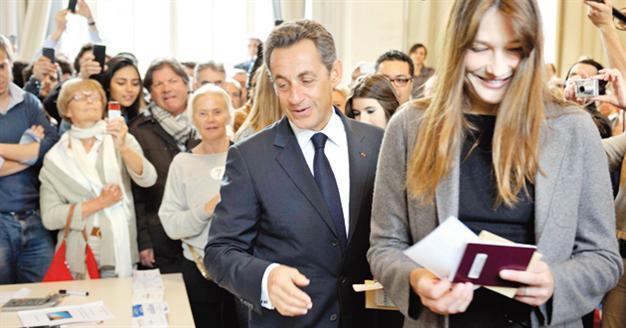French left eyes victory in parliamentary polls
PARIS

Ex-president Sarkozy and his wife Carla Bruni vote in the legislative elections. REUTERS photo AP photo
France voted yesterday in parliamentary elections that will determine whether new President François Hollande’s Socialists or rival conservatives control the government.
Hollande defeated Nicolas Sarkozy in last month’s presidential election and has called for voters to give him a strong mandate to enact reforms as France struggles with Europe’s debt crisis, rising joblessness and a stagnant economy.
Final opinion polls before the first-round vote, with round two due in a week, predicted the Socialists would, with their Green and hard-left allies, emerge with a narrow but workable majority. That would boost Hollande’s status in Europe as champion of the movement away from the German-led fixation on austerity and towards promoting growth as the solution to the continent’s lingering economic crisis.
The vote will also be a litmus test for Marine Le Pen’s National Front, which wants to ditch the euro and battles against the “Islamization” of France, after she scored 18 percent in the first round of the presidential vote. As polls suggested that 40 percent of election-weary voters might not bother to cast their ballot, the president appealed to electors to exercise their democratic right.
“I will only be able to bring about change, the change that the French have asked me to bring about, if I have a majority in the National Assembly,” he said June 7 during a visit to the northern town of Dieudonne. By midday yesterday, voter turnout stood at 21 percent, slightly down on the same time at the last parliamentary ballots in 2007, according to Agence France-Presse. After taking 51.6 percent of the vote in the May 6 presidential run-off, Hollande moved quickly to give the Socialists, who already control the upper house of parliament, an edge in the parliamentary elections.
Prime Minister Jean-Marc Ayrault’s interim government has taken a series of popular steps, including cutting ministers’ salaries by 30 percent, vowing to reduce executive pay at state-owned firms and lowering the retirement age from 62 to 60 for some workers.
Voting takes place under a constituency-based simple majority system, but in two rounds. If no candidate wins more than 50 percent in the first round, any contender with more than 12.5 percent of the vote is allowed to stay in the race for the second round.
